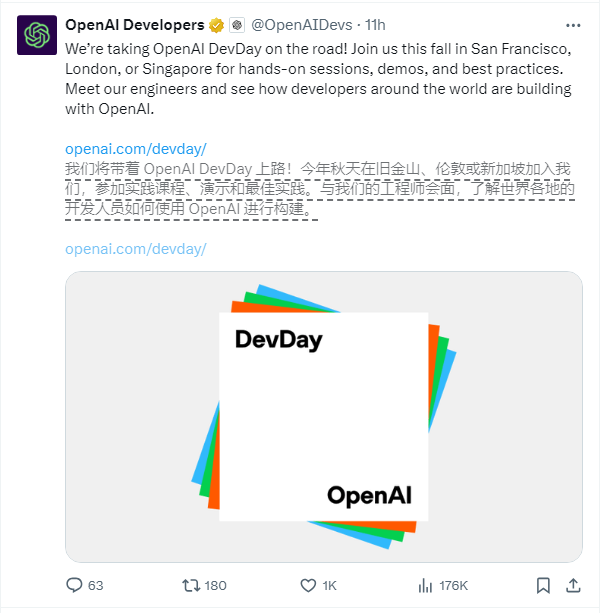OpenAI recently announced major adjustments to its annual developer conference DevDay, transforming past grand conferences into a series of global developer meetings, attracting industry attention. This change is not a simple change in form, but a reflection of the shift in OpenAI's strategic focus. It marks the company's shift from pursuing short-term sensational effects to deeply cultivating the developer ecosystem, and paying more attention to technical stability and long-term development.
Artificial intelligence giant OpenAI recently announced major adjustments to its annual developer conference DevDay, which has attracted widespread attention in the industry.
Unlike last year's grand press conference in San Francisco, this year's DevDay will take a more low-key format, transforming into a series of developer meetups around the world. This change reflects the company's shift in strategic focus from pursuing sensationalism to deeply cultivating the developer ecosystem.
An OpenAI spokesperson made it clear that the company will not release a new flagship AI model on this DevDay, but will focus on updating APIs and developer services. This decision reflects the many challenges currently faced by the AI industry and OpenAI’s response strategies. The events will be held in San Francisco, London and Singapore on October 1, October 30 and November 21 respectively, covering seminars, breakout sessions, product demonstrations, etc., aiming to provide more practical value to developers.

This strategic adjustment is consistent with OpenAI’s recent development path. The company chose to invest more energy in improving the performance and stability of existing models rather than blindly pursuing technological breakthroughs. This incremental approach to innovation may be a pragmatic response to the current state of the industry. Factors such as the scarcity of high-quality training data, the general blocking of AI crawlers by websites, and potential copyright disputes all pose challenges to the sustainable development of AI models.
Faced with these difficulties, OpenAI has taken a number of response measures. The company has licensing agreements with publishers and data brokers, and is also developing new inference techniques to improve model performance in specific domains. Chief Technology Officer Mira Murati even made an ambitious promise that future models will have PhD-level intelligence. However, behind these measures are huge R&D investments and talent costs, which have brought considerable pressure to the company.
This shift by OpenAI may also be a response to external criticism. Some people believe that companies are too pursuing the rapid progress of AI technology and ignoring security issues. By slowing down its product cycle and focusing on improving existing technology, OpenAI appears to be trying to balance innovation with responsibility.
Despite this, OpenAI still faces many controversies, including the use of copyrighted data for training and employee confidentiality agreement restrictions. Today, with the rapid development of AI technology, this strategic adjustment of OpenAI will undoubtedly have a profound impact on the entire industry. It not only reflects the company's awareness of current challenges, but also demonstrates its determination to pursue a sustainable development path in the rapidly developing field of AI.
OpenAI’s DevDay adjustment reflects the new trend in the development of the AI industry and also provides a reference for other AI companies. In the future, how to balance innovation and sustainable development will become a question that all AI companies need to seriously consider.